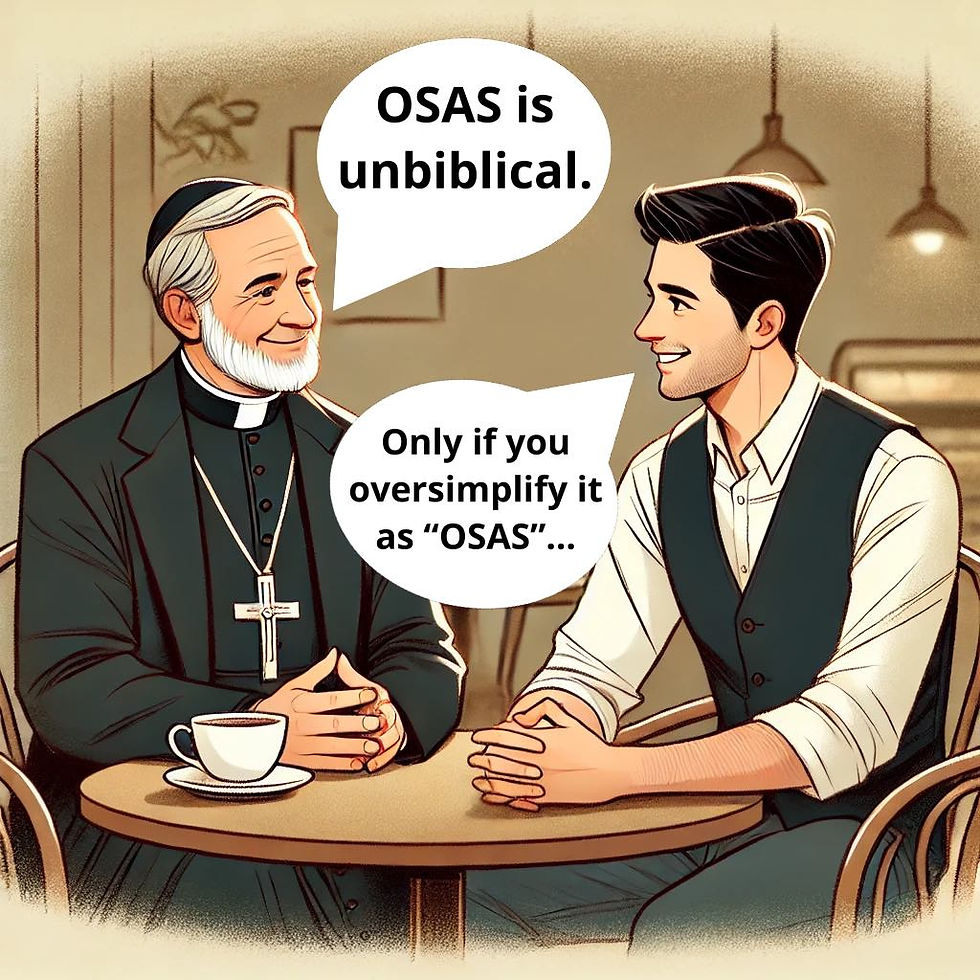Is faith a work?
- Bible Brian

- Oct 18, 2021
- 4 min read
Updated: Jul 29, 2023

All Christians, by definition, believe that salvation is by grace, through faith, and not of works. Calvinists, however, argue that if accepting the Gospel is a choice on our part, that must necessarily mean we take credit for our salvation, and that therefore, faith itself is effectively a work, and salvation is based on us, not on Christ.
But is this really the case? Is faith really a work, and does our choice to accept the Gospel really mean that we get credit for our own salvation? Far from it. Faith, on its own, is worth nothing. Remember, demons, and even Satan, all believe the Gospel, but because God has not extended the same grace to them as He has to us, as humans, their faith cannot save them. Thus, we receive absolutely no credit for salvation, even if receiving it is optional. God gets all credit because it is He who paid for our ticket to Heaven and extended the offer to us. Faith is not a work because although it's something we "do", it's not something that earns us salvation.
This is actually shown by the number of times someone in Scripture asks what they must do to earn salvation. No Apostle ever responded with a lecture about how God decides who will and will not receive it. Rather, every time they are asked, they always respond by simply saying "believe". Belief is not doing something to earn salvation, but rather it is accepting the salvation that is freely offered. Salvation is offered and given by God. It is merely received in faith.
The Calvinist response to this is that faith itself is actually a gift, to which I say I fully agree. See, the Bible says faith comes through hearing (Romans 10:17), and that you can't believe in what you haven't heard (Romans 10:14). So, all God really needs to do to give you faith is to show you something He knows will convince you.
And He does foreknow this. I firmly believe that predestination is based on God's foreknowledge (Romans 8:29-30). He knows how to make every single person believe, and so in order to predestine someone for Heaven, He can show them a thing that will make them believe. If He doesn't predestine someone, which He is quite within His rights to do, He can simply leave them alone. Further evidence of this comes from the cities of Tyre, Sidon, and Sodom. In Matthew 11:21-24, Jesus curses Chorazin, Bethsaida and Capernaum. His reasoning is that had He done His miracles in Tyre and Sidon, they would have repented in dust and ashes, and had He done them in Sodom, it would have remained to that very day (considering Sodom was destroyed in Abraham's day, that's a significantly long time). In other words, they weren't predestined to destruction by God tempting them to sin (which James 1:13 says He can't even do), but simply by leaving them on their own course.
What's more is that Jesus spoke in parables specifically to stop people from believing (Luke 8:10). The implication being if Jesus had spoken to them plainly, as He did to His disciples, more people would have believed and repented. This may have been a problem before the crucifixion, because God cannot tempt us to sin (James 1:13), meaning the best way to ensure Jesus was crucified is to ensure people were ignorant enough to do it, while Christ Himself cried out "Father, forgive them, for they do not know what they do." (Luke 23:34, emphasis added).
After the resurrection, however, this ceased to be the case. In Acts 2:36-39, we see that some of those who crucified Jesus were given the Gospel again, this time more plainly, and they were "cut to the heart" (v37), and asked "what shall we do?" Again the Apostles answered with "repent and be baptised".
All of this to say that salvation is a gift offered by grace of God. And that is a gift offered to all. The entire world can accept the Gospel (John 3:16), and God doesn't want anyone to perish, but that all should repent (2 Peter 3:9). And none of us have the excuse. We have everything we need to convince us to seek God (Romans 1:18-21; 2:12-16). But because of our sinful nature, we don't, so we need to be drawn to the Son by the Father (John 6:44) through hearing His word (Romans 10:17; Isaiah 55:11).
Putting all of this together, it's not hard to see why Calvinism exists. One could even go as far as to say that it takes a true love for the Bible to be a Calvinist, and I certainly don't think it's fair to separate from a Calvinist. After all, we do all preach the same Gospel. I don't think any Calvinist, during his outreach missions, will ever say "come to Jesus if God gives you that ability". However, Calvinism is ultimately a few verses short of a true doctrine. A full overview of the text will reveal that God's sovereignty and man's free will are not in conflict. Rather, God demonstrates His sovereignty by giving man free will, yet not being even remotely hindered by it.






Comments